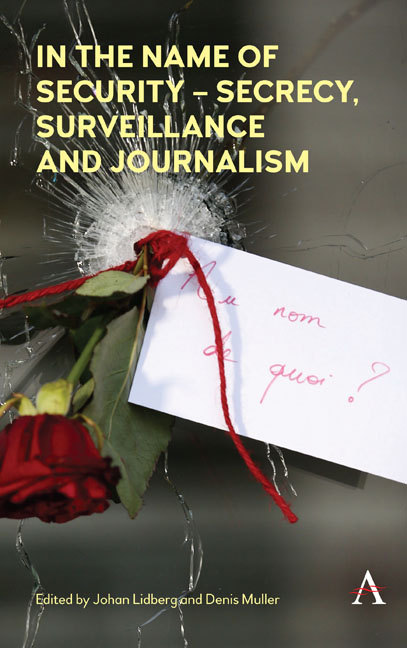Book contents
- Frontmatter
- Contents
- List of Tables
- Introduction
- Chapter 1 The Public Privacy Conundrum – Anonymity and the Law in an Era of Mass Surveillance
- Chapter 2 Undesirable Types – The Surveillance of Journalists
- Chapter 3 Surveillance and National Security ‘Hyper- Legislation’ – Calibrating Restraints on Rights with a Freedom of Expression Threshold
- Chapter 4 The Ethics of Reporting National Security Matters
- Chapter 5 When One Person's Noble Whistleblower Becomes Another's Poisonous Leaker
- Chapter 6 Who Watches the Watchmen? Access to Information, Accountability and Government Secrecy
- Chapter 7 Eyes and Ears in the Sky – Drones and Mass Surveillance
- Chapter 8 Looking over My Shoulder – Public Perceptions of Surveillance
- Chapter 9 Journalism and National Security in Three BISA Countries – Brazil, India and South Africa
- Chapter 10 Journalism and National Security in the European Union
- Chapter 11 The Security Reporter Today – Journalists and Journalism in an Age of Surveillance
- Conclusion: Journalism and the State of Exception
- Contributors
- Index
Conclusion: Journalism and the State of Exception
Published online by Cambridge University Press: 21 June 2018
- Frontmatter
- Contents
- List of Tables
- Introduction
- Chapter 1 The Public Privacy Conundrum – Anonymity and the Law in an Era of Mass Surveillance
- Chapter 2 Undesirable Types – The Surveillance of Journalists
- Chapter 3 Surveillance and National Security ‘Hyper- Legislation’ – Calibrating Restraints on Rights with a Freedom of Expression Threshold
- Chapter 4 The Ethics of Reporting National Security Matters
- Chapter 5 When One Person's Noble Whistleblower Becomes Another's Poisonous Leaker
- Chapter 6 Who Watches the Watchmen? Access to Information, Accountability and Government Secrecy
- Chapter 7 Eyes and Ears in the Sky – Drones and Mass Surveillance
- Chapter 8 Looking over My Shoulder – Public Perceptions of Surveillance
- Chapter 9 Journalism and National Security in Three BISA Countries – Brazil, India and South Africa
- Chapter 10 Journalism and National Security in the European Union
- Chapter 11 The Security Reporter Today – Journalists and Journalism in an Age of Surveillance
- Conclusion: Journalism and the State of Exception
- Contributors
- Index
Summary
This book opened with a quote from US author and Washington Post journalist Barton Gellman:
So where we are now is in a place where we're living behind one- way mirrors. Corporate America and law enforcement and the national security state know so much about us and we know so little about them. We know so little about what they're doing and how they're doing it. And we can't actually hold our government accountable because we truly don't know what it's doing.
(Smith 2014)This quote is from part two of a Public Broadcasting Service (PBS) documentary called United States of Secrets. But Michael Hayden, former Director of the US National Security Agency (NSA), countered Gellman's sentiment in the same documentary:
Look, let me give you the existential complaint of the US intelligence community. Here's how it works living inside Americas liberal democracy of which the intelligence community is really a part. American political elites feel very empowered to criticise the American intelligence community for not doing enough when they feel endangered. And as soon as we've made them feel safe again, the feel equally empowered to complain that we're doing too much.
(Ibid)These two entirely reasonable propositions vividly illustrate how complex is the policy task of achieving balance between national security and preservation of liberal democratic freedoms. The aim of this book was to assess how this balance has been struck across a range of diverse democratic polities in the post– 9/11 era. The broad policy response has been defined by Agamben (2005), when he coined the phrase ‘state of exception’. It captures the idea that in times of (perceived) exceptional peril, states use this fear- driven security paradigm to make some incursions upon the civil liberties that are central to defining a democratic society: freedom of speech, freedom of the media, public access to government information and accountability of government agencies.
What effect is this ‘state of exception’ having on journalism and its role as provider of information to the public and in its capacity to function as the fourth estate, the independent watchdog over state power? That is the central question addressed in this book.
- Type
- Chapter
- Information
- In the Name of Security - Secrecy, Surveillance and Journalism , pp. 231 - 244Publisher: Anthem PressPrint publication year: 2018



